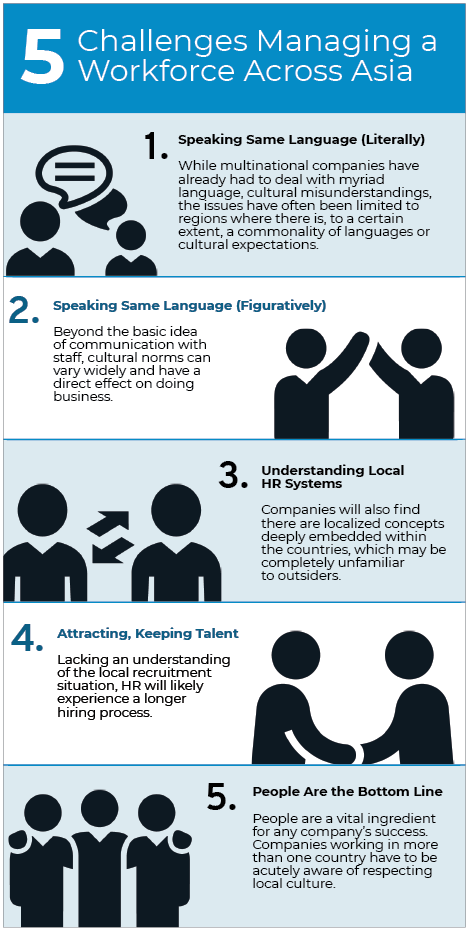As a business expands and becomes more global, human resource (HR) managers face obstacles ranging from language, culture, and specific regulations to HR systems and more. As such, firms should have a strong understanding of each country they enter—and expect certain challenges along the way.
By anticipating these issues before they occur, HR managers can better plan and create systems for strong communication and coordination, leading to eventual success in emerging Asian markets.
Through our professional experiences with managing multiple offices throughout Asia and consulting clients with Asian operations, we have identified five specific problems that HR managers often experience.
Speaking the Same Language (Literally)
 While multinational companies have already had to deal with myriad language and cultural misunderstandings, the issues have often been limited to regions where there is, to a certain extent, a commonality of languages or cultural expectations.
While multinational companies have already had to deal with myriad language and cultural misunderstandings, the issues have often been limited to regions where there is, to a certain extent, a commonality of languages or cultural expectations.
For instance, European languages largely have similar language roots, and the business norms do not differ significantly from one country to the next. In Asia, however, there is a much greater diversity of language families without high proficiency in a common working language, like English.
Thus, firms should be prepared to pay a premium to attract talent with both professional and language capabilities.
This is a bigger problem for low-headcount countries that lack specialist resources, such as Vietnam and Indonesia. It is less of a problem in countries where the average English capabilities are already high, such as Mongolia, the Philippines, and Thailand.
Speaking the Same Language (Figuratively)
Beyond the basic idea of communication with staff, cultural norms can vary widely and have a direct effect on doing business.
For example, HR managers in India have to be acutely aware of the wide variation between regions, as simple ideas can become quite complex.
Let’s take the example of annual leave. In India, there are numerous regional holidays, with many based on religion. However, the permitted public holidays as well as the number of leave days differ from region to region.
Out of 12 public holidays, Delhi and Mumbai have eight in common. Out of that eight, three have differing leave days.
To deal with variations, companies working in India should prioritize configuring a company enterprise resource planning (ERP).
Beyond knowing and respecting local schedules, HR managers also have to learn about local practices and concepts.
In China, there is widespread acceptance about the idea of “mianzi,” or “face.” “Face” means personal reputation and community standing. Sometimes, local HR managers will pretend to understand more than they do, leading to compliance holes and exposing headquarters to risk.
People do not wish to “lose face,” and they will also be careful about causing others to lose face. This may come up in performance reviews. Managers may generally equivocate on the performance of an employee to avoid giving negative feedback.
Understanding Local HR Systems
 Companies will also find that there are localized concepts deeply embedded within countries that may be completely unfamiliar to outsiders.
Companies will also find that there are localized concepts deeply embedded within countries that may be completely unfamiliar to outsiders.
A prime example is the concept of a “hukou” in China. Chinese HR managers are familiar with the hukou, but it can be difficult for others to understand.
Essentially, a hukou can be thought of as a domestic passport for Chinese citizens, linking each individual to their home city. It is important because the home city ascribed to that individual’s hukou will affect his or her social insurance benefits.
Hukous tied to large cities like Beijing, Shanghai, and Shenzhen are advantageous because it allows those holders to apply for benefits in those cities, including purchasing local property or sending children to local schools. Therefore, companies have to consider the hukou of employees, and also are expected to help employees apply for a change of hukou if necessary.
Moreover, social insurance systems can be hard to navigate as each country is different. Some have intricate networks, like China, while others are relatively simple. Chart 2 explores the diversity of social insurance systems and illustrates how complicated it can be for HR managers to oversee them collectively.
Attracting and Keeping Talent
When HR works in an emerging Asian country for the first time, it experiences a number of recruitment challenges because of the different methodologies in each country. Lacking an understanding of the local recruitment situation, HR will likely experience a longer hiring process.
In China, recruitment is largely done through a few major websites that publish hiring advertisements. The recruiter can reach out to interesting candidates for interviews, which are usually conducted through telephone, Skype, or in-person. Candidates with proficient levels of English are easy to find. Background checks through reliable and reasonably priced services are becoming increasingly popular.
Recruitment channels are similar in Vietnam. However, background checks remain difficult to carry out and are thus uncommon. Moreover, it is more difficult to find talent with English proficiency.
Typically, in either China or ASEAN, checking a potential employee’s credit will be very difficult as the local credit system has not been sufficiently developed. Companies have to develop a workaround for this issue if they wish to check this information.
In India, recruitment is mostly done through a recruitment agency. In fact, only large companies have internal recruitment teams that directly hire staff. Recruitment agencies handle all levels of hiring ranging from highly senior to very junior positions. In addition, background checks are rare as they are more difficult to carry out and thus more expensive. However, background checks will yield a large volume of information.
Companies should also be aware that there is a lot of high staff turnover in emerging Asian countries—particularly at the junior levels. If the company wants to keep young staff, then HR managers need to make concerted efforts to retain them. For example, the company could hire internal HR staff with good soft skills, especially interpersonal competence, to increase staff loyalty.
Furthermore, companies should realize that they will need to provide higher salary increases for young talent as well as training. Otherwise, there is high risk that junior position staff will leave before they reach management level within the organization.
People Are the Bottom Line
People are a vital ingredient for any company’s success. Companies working in more than one country have to be acutely aware of respecting local culture. In practice, HR managers have to undertake the majority of responsibility.
A highly organized internal system can be one solution if the company is large enough to scale to that size. Additionally, companies can inquire about appropriate external service providers in one or more of the countries in which they do business.
Editor’s note: Dezan Shira & Associates is a specialist within specific regions. The information shared in this interview is based upon its experience in emerging Asia. It is not a global provider.

Adam Livermore is Partner at Dezan Shira & Associates. He specializes in payroll, human resources, and corporate compliance in China and leads the team providing integrated payroll processing services to clients across China, India, and ASEAN. Currently based in Dalian, China, Livermore has spent over two decades working in Asia. His experiences in Japan, China, Hong Kong, and now India, Vietnam, and Singapore have allowed him to build legal and payroll expertise in these regions, and eventually led him to helm Dezan Shira & Associates’ payroll and human resources services. With on-the-ground observations, Livermore has been able to accumulate insight into the increasingly complicated world of global payroll.

Helen Kong is Manager of Human Resources Administration and Payroll Services at Dezan Shira & Associates. She has been working in the Dezan Shira HR field since 2008 and leads a specialized team in Dalian, China, for payroll and HR admin outsourcing services. Kong has expertise in providing tax planning and advisory services for foreign individual income tax matters and has helped newly established companies on HR start-up related services.